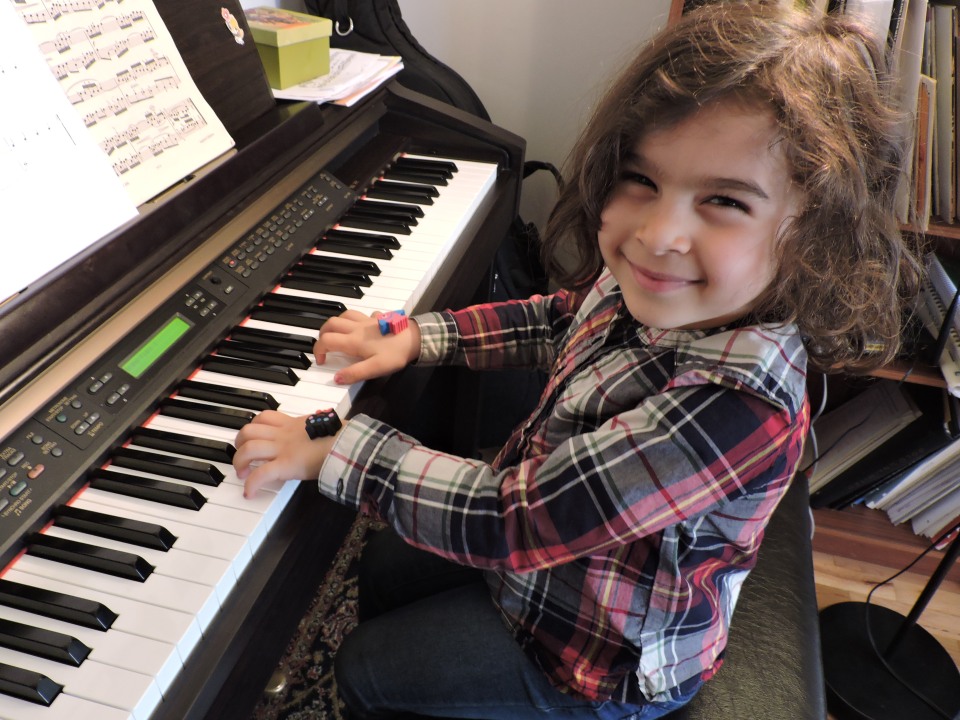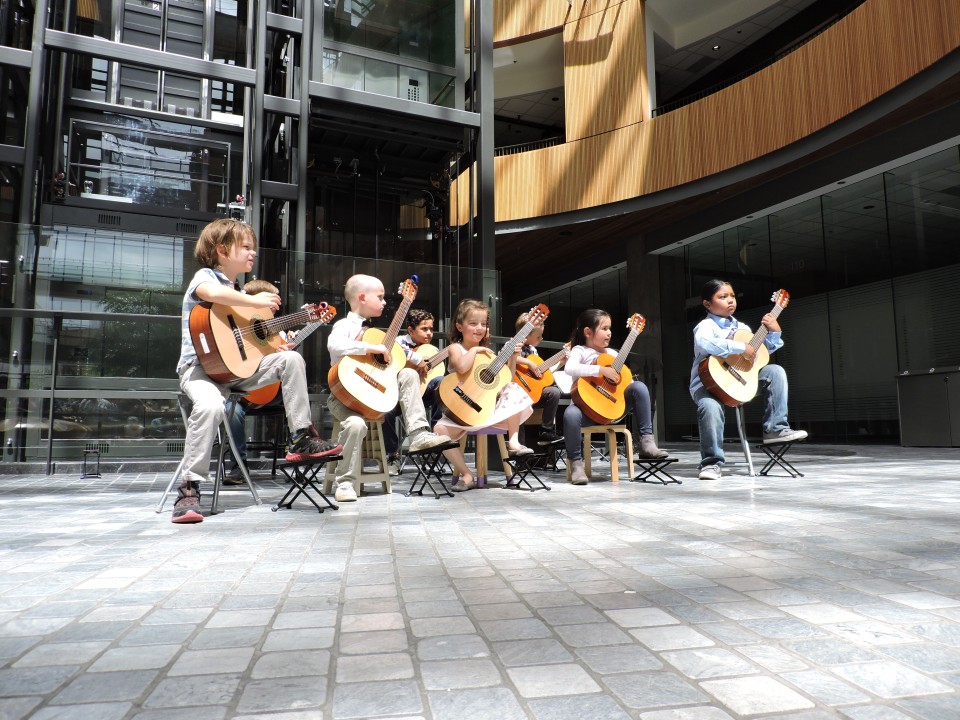My studio is open to all ages and levels. Everyone deserves to be able to express themselves through music, and everyone can. All you need is enthusiasm and some regular practice time. We pick the program together and make a learning plan that works for your personality and your goals.

The very beginning
For students of all ages, being consistent and building good learning habits from the very beginning is a huge part of success. Out of that will come ease, joy, and fun. Focused structured learning that we call “work” exists side by side with a free-form experience which we tend to call “fun.” The trick is to balance the two wisely.
Half of your success in learning an instrument will be listening to music as much as possible, singing along, tapping along, dancing – being engaged in every way you can. You voice and body are two most natural musical instruments. The other half is practicing the tools to play the music.
If having fun in music lessons is a number one priority for you, make sure to communicate that clearly to your prospective teacher so they understand your expectations. Try to describe:
What does having fun in music lessons mean for you/your child?
What would you like your child (or yourself) to be able to do as a result of music lessons?
It will often clarify whether the teacher is right for you or even whether private lessons are what you need. There are group classes that don’t require preparation or practice, for example. For private lessons, active listening, following instructions, and completing assignments are normal things to be expected.
What exactly is learning a musical instrument?
Learning and playing a musical instrument is an art, a sport, a science, and a culture. It exercises your body and your brain, heightens your awareness of the world, expands your emotional range, and boosts creativity. You don’t just learn to be a good player, you learn to be a well-rounded and resourceful person, a good, caring human being. You also learn how to cope with stress. Making a mental or a physical effort is, essentially, a kind of stress or pressure. So is accountability to another human being (teacher and/or parent). The skills you learn in your music lessons over the years are transferable to school and university subjects, sports, jobs, and relationships. Here are a only few of those skills and benefits:
focus ~ memory ~ consistency ~ creative problem-solving ~ mindfulness
fine motor skills ~ coordination ~ knowing your body ~ endurance ~ resilience ~ accountability ~ work ethic ~ knowing when to let go ~ stress management ~
turning challenges into opportunities ~ not giving up!
Go to your room and practice!
Practice is important. It is watering the seed that will sprout and turn into a plant.
Just think what happens if we stop watering our plant (succulents don’t count).
Equally important is creating a positive and productive experience out of every practice session, 5min or 50min. It is setting the right attitude and goals, even for the littlest ones. We get good at what we do often and a lot – that’s practice. In the lesson, we learn new things and figure out what to do to get better. The actual getting better happens in between lessons (processing, internalizing, and solidifying over the course of time). If a practice session doesn’t go well, do not get discouraged. Things take time, and we must respect that.
Progress
In an ideal world, you or your child can get to Grade 1 or even Grade 2 level in three months and play with complete ease. All it takes is mindfully following instructions in the lesson and at home. Elementary, Watson! This is what we tend to want – get good quickly. However, most human beings live in a less than ideal world: work, family, after-school activities, health conditions, distractions in abundance…What do we do?
Starting is the hardest part. We start somewhere, anywhere. We start small. We start with “more than none” every time. Even if you sit down with your child (or by yourself) to say “hello” to your instrument for one minute – it counts. Young children especially are not expected to start playing right away. They meet their instrument, they learn to sit, they learn to listen and respond. The instrument becomes part of their life, a friend, an outlet, something permanent and long-term, a tradition.
If your practice is going down the drain, turn on a recording of your piece, dance to it, follow with the score, colour your piece – all of those things are beneficial. And once you’ve done something like that, it feels good, even great! Often, it will propel you right into the practice zone.
Challenges
At the same time, as all long-term processes, learning music has cycles of ups and downs, and we shouldn’t expect it to be rainbows all the time. It’s OK to not feel good about your playing, lesson, or practice sometimes. There will be challenges and difficulties, and the right attitude is everything. Normally, there is always a leap up after overcoming a challenging stage. The trick is to stick around long enough to find out!
Health challenges are quite frequent among students and are carefully taken into consideration. The things that tend to affect learning the most, are: attention or focus difficulties, and anxiety. Both are responses to pressure or stress. Sources of stress in a private lesson may include: following instruction, sitting still, reading music, repeating something, completing assignments, getting critique.
For learners ages 3-7 and their parents
Kids need lots of support from family to get used to the learning process. How the parent feels about the process will affect how the child learns and what kind of attitude the child will develop towards learning an instrument. It always helps to trust and follow the teacher’s advice, even it seems insignificant. Don’t dismiss things like “watch Jimmy’s right shoulder when he practices and make sure it’s down” or “make sure Jane’s finger two is on its tip every day of the week.” If the parent is unsure whether these things matter, the child is likely to sense it easily. The parent is the strongest example and the most powerful role model the child has at this age. So enthusiasm and being consistent is just as contagious!

Adult learners
Dear adults, your brain is often much faster than your hands. It is great for covering lots of concepts in a short time and progressing really quickly. Challenge yourselves, but don’t rush your body as it learns; don’t give up if things don’t happen right away. Always practice ease and accuracy, no matter how slowly. Remember, whatever you practice regularly will stick with you. When you practice slower, you progress faster. When you practice faster, you progress slower. It’s true for most humans in our solar system.
Example: When you (an adult) practice a scale without knowing what you are practicing about it, it may come out with a new hiccup each time and your brain will keep it on the surface and think of it as something fuzzy. If you practice the same scale naming the notes/fingers/strings in turn or feeling each finger take its place – you start to really know it. With each repetition, it becomes clearer and more comfortable and yours forever. Once at that stage, you can forget all that nonsense about finger naming and rock away. That applies to any given element of your practice. Always aim to play or repeat with intention during a practice session. Five minutes of mindfulness saves hours.
One must always practice slowly.
If you learn something slowly, you forget it slowly.
~ Itzhak Perlman
Ensemble playing
…is invaluable to learners of all ages, because it is:
- talking in the language of music! (the Suzuki method thrives on this principle)
- teamwork, respect, learning to hear others
- belonging in a group of like-minded people
- a common project and a common goal, sharing responsibility
- creating something that wasn’t there before
- learning to interact, help each other, and support each other
- bouncing energy around, laughing, making mistakes, observing and learning from others
Why do this at all, in the end?
Having a passion for music is a powerful motivator, of course. But we can’t ride on passion alone.
After that, it is developing all the wonderful universal skills and habits mentioned above. Also, knowing that you can do something really well boosts your confidence and enthusiasm for learning new things.
Thirdly, playing an instrument can be a meaningful way to connect with people while creating something beautiful.
And lastly and most importantly: in times of stress, little or big, people of all ages look to permanent and stable things for support: a routine, a tradition, a faith, a loved one, a fulfilling activity. As outside circumstances change constantly during a lifetime, knowing who you are and having a strong inner core is of great comfort and reason to move forward. Playing an instrument can add to that what you are and become a powerful expression outlet for both times of joy and times of sadness.
Our contemporary world urges us to move on at fantastical speeds. We end up scraping the surface of a million things and people during the day. In fact, not doing that tends to cause anxiety and unrest. Our values end up being all upside down and inside out. It’s OK to stop once in a while and listen to the tone of your instrument for 5 minutes, feel the touch of a piano key or the bounciness of a guitar string.
When you come to your music lesson, please bring your most positive attitude and, of course, all your books!
